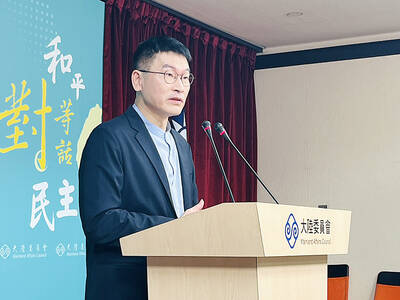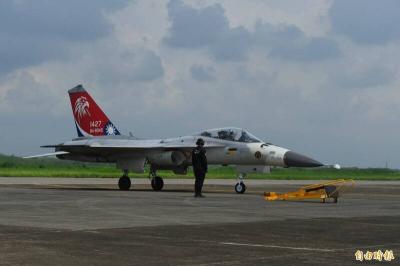US and Taiwan military officials have warned that the Chinese People’s Liberation Army (PLA) could implement a blockade within “a matter of hours” and need only “minimal conversion time” prior to an attack on Taiwan, a report released yesterday by the US-China Economic and Security Review Commission said.
“The [US] and its allies and partners can no longer assume that a Taiwan contingency is a distant possibility for which they would have ample time to prepare,” it said.
The commission made the comments in its Annual Report to Congress, a 700-page document with a chapter dedicated to Taiwan.

Photo: Reuters
“Beijing has continued to escalate military pressure on Taiwan both through near-daily military operations near Taiwan and large-scale exercises designed to rehearse invasion and blockade scenarios,” it said.
China’s activity in the Taiwan Strait and the South China Sea is rapidly increasing, while Beijing ramps up military capabilities and develops new weapons such as self-propelled landing barges, the world’s largest amphibious ship and hypersonic missiles that could target US deployed forces, commission Vice Chair Randy Schriver said in a briefing yesterday.
The report said that the PLA escalated military pressure against Taiwan by 300 percent last year, as testified by Admiral Samuel Paparo to the US House of Representatives Armed Services Committee in April.
“As of Oct. 10, 2025, there have been 3,056 PLA incursions into Taiwan’s ADIZ [air defense identification zone] this year, up 33 percent from 2,301 incursions during the same period in 2024,” the report added.
These large-scale, unannounced exercises are designed to normalize military activity near Taiwan, “making it more difficult to detect if China is preparing for an actual blockade or invasion and potentially dramatically reducing the time Taiwan and the United States would have to respond,” it said.
Meanwhile, China has continued to expand its use of cyberattacks and information warfare targeted at Taiwan’s government and society, it said.
These multifaceted campaigns work to weaken Taiwanese society’s will to resist and sow doubt in the US’ commitment to Taiwan, using economic coercion, espionage, disruption to undersea cables and cognitive warfare tactics, including social media propaganda, it said.
Since the beginning of last year, Taiwanese government Web sites have suffered an average of about 2.2 million cyberattacks per day, mostly originating from China, it added.
“China has been using Internet trolls, bots and generative artificial intelligence (AI) tools to shape online discourse on controversial topics like Taiwan Semiconductor Manufacturing Co’s (TSMC) investments in the United States as part of a coordinated cognitive warfare campaign designed to stoke social divisions,” it said.
It has also ramped up smear campaigns and intimidation of “Taiwan separatists,” it said, referencing a planned attack on Vice President Hsiao Bi-khim (蕭美琴) last year.
Moreover, “Beijing has sought to strengthen pro-China sentiment in Taiwan by continuing to invite opposition political leaders to visit China and organizing highly politicized cross-strait exchange programs targeted at youth groups in Taiwan,” it said.
However, it said that “Taiwan’s overall economic picture remains strong with continued growth,” despite punitive trade measures.
Beijing is also unwilling to target TSMC or information communication technology supply chains, demonstrating “limitations in taking actions that would truly damage Taiwan’s economy,” it said.
Taiwan has also stepped up self-defense capabilities through increased military spending, defense procurements, US training collaborations and President William Lai’s (賴清德) “whole-of-society resilience” initiative, it said.
In terms of rhetoric, Beijing continues to downplay the possibility of a Taiwan invasion in English, while domestic, Chinese-language propaganda suggests China may take action in the near future, it said.
The report closely aligns with the Ministry of National Defense’s report released in August, citing 2049 as a potential flashpoint as Beijing’s date for “the great rejuvenation of the Chinese nation.”
It also highlighted analysts' predictions for 2027, the 100-year anniversary of the PLA, and 2035, the date set for “complete military modernization” and a high-speed railway connecting China’s Fujian Province to Taiwan.
However, there is “no indication that China is planning an imminent attack,” the report added.

LOW RISK: Most nations do not extradite people accused of political crimes, and the UN says extradition can only happen if the act is a crime in both countries, an official said China yesterday issued wanted notices for two Taiwanese influencers, accusing them of committing “separatist acts” by criticizing Beijing, amid broadening concerns over China’s state-directed transnational repression. The Quanzhou Public Security Bureau in a notice posted online said police are offering a reward of up to 25,000 yuan (US$3,523) for information that could contribute to the investigation or apprehension of pro-Taiwanese independence YouTuber Wen Tzu-yu (溫子渝),who is known as Pa Chiung (八炯) online, and rapper Chen Po-yuan (陳柏源). Wen and Chen are suspected of spreading content that supported secession from China, slandered Chinese policies that benefit Taiwanese and discrimination against Chinese spouses of

PROMOTION: Travelers who want a free stopover must book their flights with designated travel agents, such as Lion Travel, Holiday Tours, Cola Tour and Life Tours Air Canada yesterday said it is offering Taiwanese travelers who are headed to North America free stopovers if they transit though airports in Japan and South Korea. The promotion was launched in response to a potential rise in demand for flights to North America in June and July next year, when the US, Canada and Mexico are scheduled to jointly host the FIFA World Cup, Air Canada said. Air Canada offers services to 13 of the 16 host cities of the tournament’s soccer games, including Toronto and Vancouver; Mexico City, Guadalajara and Monterrey in Mexico; Atlanta, Georgia; Boston; Dallas; Houston;

The US approved the possible sale to Taiwan of fighter jet spare and repair parts for US$330 million, the Pentagon said late yesterday, marking the first such potential transaction since US President Donald Trump took office in January. "The proposed sale will improve the recipient's capability to meet current and future threats by maintaining the operational readiness of the recipient's fleet of F-16, C-130," and other aircraft, the Pentagon said in a statement. Trump previously said that Chinese President Xi Jinping (習近平) has told him he would not invade Taiwan while the Republican leader is in office. The announcement of the possible arms

ALIGNED THINKING: Taiwan and Japan have a mutual interest in trade, culture and engineering, and can work together for stability, Cho Jung-tai said Taiwan and Japan are two like-minded countries willing to work together to form a “safety barrier” in the Indo-Pacific region, Premier Cho Jung-tai (卓榮泰) yesterday said at the opening ceremony of the 35th Taiwan-Japan Modern Engineering and Technology Symposium in Taipei. Taiwan and Japan are close geographically and closer emotionally, he added. Citing the overflowing of a barrier lake in the Mataian River (馬太鞍溪) in September, Cho said the submersible water level sensors given by Japan during the disaster helped Taiwan monitor the lake’s water levels more accurately. Japan also provided a lot of vaccines early in the outbreak of the COVID-19 pandemic,